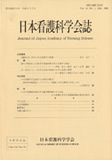Japanese
English
- 販売していません
- Abstract 文献概要
- 参考文献 Reference
要旨
本研究はシスプラチンを投与される肺癌患者15名を対象に,治療中の良好な栄養状態を保持するための看護援助方法を検討する目的で,はじめに患者の栄養状態を評価し,次いでその影響因子を明らかにした.
①栄養状態の評価には,体重,皮下脂肪厚,上腕筋囲,握力,血色素量,血清総蛋白および血清アルブミンの7指標を用いたが,皮下脂肪厚が癌化学療法中の栄養状態の変化の指標として最も鋭敏であることが判明した.
②皮下脂肪厚の変動には食事の摂取量が影響し,食事の摂取量には嘔気・嘔吐,特性不安得点,感染による発熱の最高値が関連していることが重回帰分析より明らかになった.
③したがって,癌化学療法中の患者の栄養状態を良好に保持するためには,看護援助方法として,第一に定期的な身体計測により栄養状態を評価すること,第二に嘔気・嘔吐を軽減するように努め,不安の強い患者に対しては精神的安定が得られるように援助し,感染予防に対する患者の自己管理能力が高まるように働きかけ,これらにより十分な食事摂取ができるようにすること,が必要であるとの結論が得られた.
Abstract
In an attempt to find a method for effective nursing support which would maintain a favorable nutritional status in patients receiving chemotherapy, the nutritional status of 15 patients with lung cancer receiving cisplatin therapy was evaluated, and the factors influencing their status were studied.
(1) Nutritional status was evaluated in terms of 7 indicators: body weight, skinfold thickness, arm muscle circumference, grip strength, hemoglobin level, serum total protein and serum albumin. Among these, skinfold thickness proved to be the most sensitive indicator of the changes in nutritional status of cancer patients during chemotherapy.
(2) Multiple regression analysis revealed that skinfold thickness was influenced by dietary intake, which in turn was related to nausea, vomiting, trait anxiety level estimated by STAI and maximum body temperature associated with infection.
(3) It was concluded that the following nursing interventions are significant for maintenance of favorable nutritional status for cancer patients during chemotherapy. First, periodic evaluation of their nutritional status by anthropometric measurements is necessary. Secondly, efforts should be made to reduce nausea and vomiting, to reassure patients with severe anxiety so that they become mentally stable, and to motivate the patients to perform self-care for prevention of infection, thereby achieving a sufficient dietary intake.
Copyright © 1993, Japan Academy of Nursing Science. All rights reserved.


